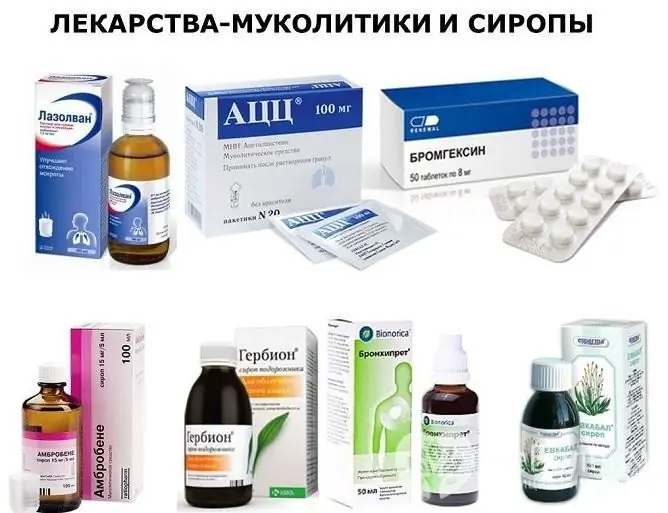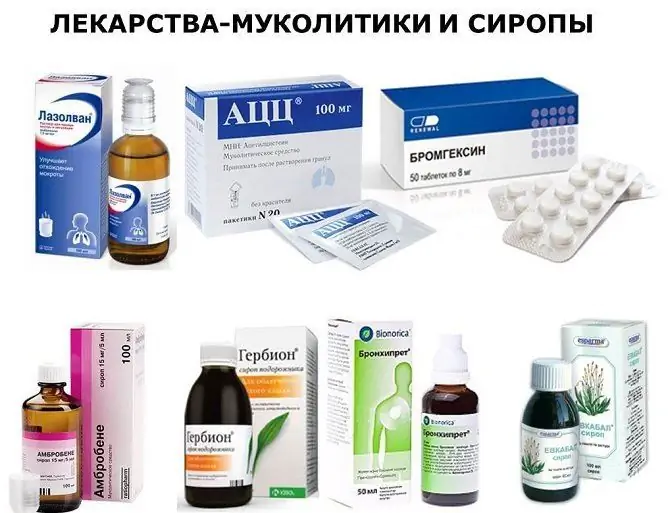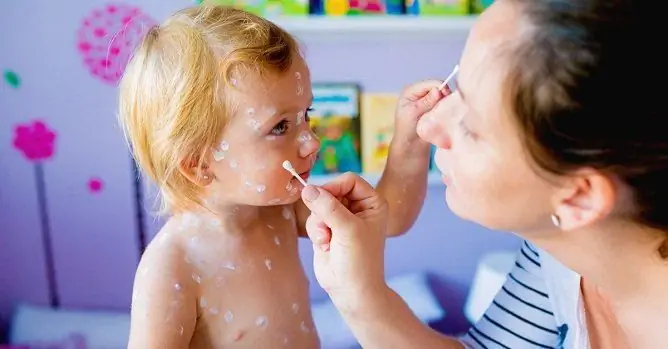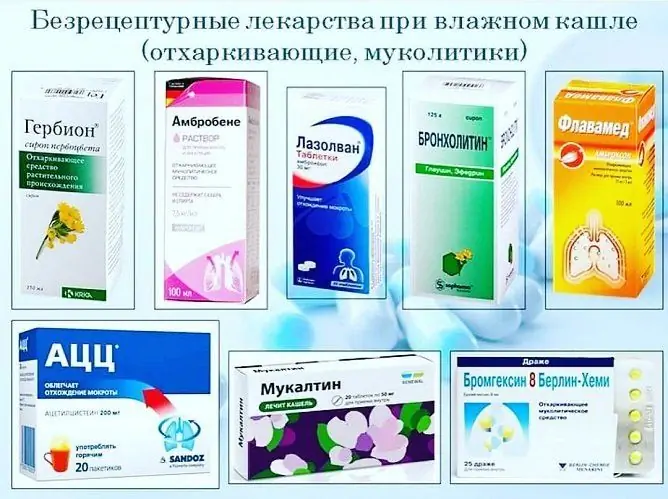- Author Rachel Wainwright wainwright@abchealthonline.com.
- Public 2023-12-15 07:39.
- Last modified 2025-11-02 20:14.
Medicines for bronchitis and cough in adults and children
The content of the article:
- Essential medicines for bronchitis in adults and children
- Features of the use of drugs for bronchitis in children
- Approach to the treatment of bronchitis
- Traditional methods and remedies for bronchitis in adults and children
- Causes and risk factors for developing bronchitis
- Signs of bronchitis
- Video
What medications for bronchitis and cough in adults and pediatric patients contribute to an early cure? This is an urgent question, since this disease is one of the most common pathologies of the respiratory system in any age category.
Today, the pharmacy chain has a large assortment of inexpensive drugs that can effectively treat bronchitis. However, it should be borne in mind that medicinal products containing the same substance may have different commercial names and differ significantly in cost.

Mucolytics - drugs that are prescribed for bronchitis to thin phlegm
If signs of bronchitis appear, you should consult a doctor who will select a treatment. This is important, since there is no list of the best universal drugs that would be equally effective for all forms of the disease, each type of bronchitis, and moreover, each patient requires careful selection of drugs and control of treatment.
In severe cases, drugs are prescribed in the form of injections, but, as a rule, patients with severe bronchitis are hospitalized and treated in a hospital. In other cases, the drugs are taken in oral form, in the form of tablets or suspensions. However, syrups, suspensions, and pills for bronchitis in adults and children must be taken carefully observing the dosage and following all the recommendations of the attending physician.
Essential medicines for bronchitis in adults and children
Medical treatment of bronchitis does not imply the mandatory prescription of antibiotics, for example, in case of bronchitis of viral etiology, they are contraindicated. In this case, it may be necessary to prescribe antiviral drugs (Interferon, Amiksin), if the causative agents of the disease are microscopic fungi, antimycotics are used.
Antibiotics for bronchitis are used when bacteria are the infectious agent, or when a secondary bacterial infection is attached to non-bacterial bronchitis. Usually, for the appointment of antibacterial drugs, a laboratory examination of sputum with the isolation of the pathogen and an antibiogram is required. If such analyzes have not been performed (or until the test result is ready), broad-spectrum antibiotics are prescribed.
The first line drugs for the treatment of bronchitis are antibiotics of the aminopenicillin group (Amoxicillin, Ampicillin) due to their effectiveness and the minimum number of side effects. An increase in efficiency can be achieved by combining these agents with beta-lactamase inhibitors.
With individual intolerance to aminopenicillins, antibacterial agents of the macrolide group (Azithromycin, Erythromycin) are prescribed, which can destroy the DNA of bacteria. Such drugs are effective both against gram-positive cocci (staphylococci, streptococci) and against membrane and intracellular parasites (mycoplasma, chlamydia), therefore, they are also used for the treatment of atypical forms of bronchitis. Macrolides have not only antibacterial but also anti-inflammatory effects.
Fluoroquinolones (Levofloxacin, Moxifloxacin) are usually prescribed only to adult patients, as they often cause allergic reactions and other side effects.
In some cases, cephalosporins (Cefazolin, Cefuroxime) are prescribed for bronchitis.
The course of treatment of bronchitis with antibacterial drugs lasts 5-10 days. It is forbidden to interrupt it earlier without consulting a doctor, even if the patient's well-being has rapidly improved. The prescribed dosage should be carefully observed. If a dose was accidentally missed, you cannot take a double dose next time.
To liquefy sputum and remove it from the bronchi, mucolytic agents are prescribed, which include Bromhexine, Acetylcysteine, as well as plant-based syrups, which include thermopsis, licorice root, marshmallow root, thyme, etc.
When the temperature rises, antipyretic drugs are used (Aspirin, Paracetamol, Ibuprofen).
With allergic bronchitis, as well as with chronic bronchitis of a different etiology, antihistamines are indicated (Suprastin, Loratadin). In some cases, it may be necessary to use hormonal anti-inflammatory drugs.
Inhalation has a good therapeutic effect - it promotes the discharge of sputum and the speedy regeneration of the affected tissues. For them, solutions of mucolytics, anti-inflammatory drugs, salt, alkaline solutions, decoctions and infusions of medicinal plants are used. Steam inhalations are contraindicated at elevated temperatures, in this case they are carried out using a nebulizer, sprays.
Features of the use of drugs for bronchitis in children
Medicines for bronchitis for children basically correspond to those for adult patients, differing only in form (suspensions and syrups instead of tablets and capsules) and dosage.
Children should not take Aspirin and other antipyretics based on acetylsalicylic acid, especially with a viral infection, as there is a risk of severe complications.
Antitussive drugs are prescribed with great care, since, by preventing the elimination of toxins from the respiratory tract, they can aggravate the course of the disease.
Children should not be inhaled with hot steam; instead, use a nebulizer.

Hot steam inhalation is contraindicated in pediatric patients
Approach to the treatment of bronchitis
With bronchitis, self-medication is highly discouraged, since it significantly increases the risk of the disease becoming chronic and the development of complications. In addition, attempts to self-treat bronchitis are dangerous with the risk of misdiagnosis of the disease, since similar symptoms can be observed in tuberculosis, pneumonia and a number of other respiratory diseases.
In uncomplicated bronchitis, treatment is carried out on an outpatient basis. Small children, weakened patients, as well as patients with a severe course of the disease must be admitted to the hospital.
In case of acute bronchitis in the first days of the disease (while the fever lasts), bed rest is indicated. At the stage of recovery, as well as patients with chronic bronchitis, it is necessary to spend time in the fresh air every day.
The patient's daily menu should contain a sufficient amount of proteins, foods rich in vitamins, antioxidants. It is recommended to include lean meat and fish, dairy products, vegetables and fruits in the diet. You should limit or exclude heavy foods from the diet. Shown a plentiful drinking regime. It is useful to drink mineral water with warm milk, fruit drinks, jelly, juices, mint, lime tea, rosehip infusion, warm milk with honey.
Dusty areas and inhalation of substances that irritate the respiratory tract and cause excessive mucus production should be avoided.
Treatment of bronchitis should be comprehensive. Drug therapy can be effectively supplemented with massage, breathing exercises.
Uncomplicated bronchitis can usually be cured in 1.5-2 weeks; severe forms of the disease may take a month to cure.
Traditional methods and remedies for bronchitis in adults and children
In addition to the main therapy, folk remedies can be used, however, as is the case with traditional medicines, they can be used only after consultation with your doctor.
A popular cough remedy is horseradish honey. For its preparation, honey is mixed with grated horseradish in equal proportions. The remedy is consumed in a tablespoon before meals until the inflammation subsides.
Herbal infusions that help with bronchitis include a remedy from coltsfoot, nettle, eucalyptus and St. John's wort. The ingredients are mixed in equal proportions, a tablespoon of the mixture is poured with a glass of boiling water and insisted in a thermos for 1-2 hours. The finished infusion should be filtered and taken in a glass a day.
A mixture of pine resin and honey is believed to be an effective remedy for both acute and chronic bronchitis. In a container, mix a glass of honey and resin and keep on fire until a homogeneous mass is obtained (without bringing to a boil). This remedy is taken in a teaspoon 3 times a day with hot milk.
You can use a remedy made from lemons (2 pieces) and horseradish (100 g), which are crushed, mixed and consumed in the morning before breakfast and before going to bed for a teaspoon.
A good remedy for bronchitis is a mixture of butter (500 g), pork fat (500 g), aloe juice (150 ml), cocoa powder (100 g), which are mixed and stored in the refrigerator. Take a tablespoon several times a day.
For adults, aloe and cahors can be used. To prepare it, you need to grind 200 g of aloe leaves, then pour 500 ml of Cahors into them. Then 300 g of honey is added to the mixture and left for 15 days. Filter the finished product and take a tablespoon 3 times a day.
Causes and risk factors for developing bronchitis
The disease is recorded in people of all ages, and can have an infectious and non-infectious etiology. The causative agents of infectious bronchitis are viruses, bacteria, microscopic fungi. Viruses are most often infectious, and bronchitis caused by fungi is least common. Atypical pathogens include mycoplasma, chlamydia. Bronchitis often occurs against the background of acute respiratory viral infections, when the mucous membrane of the bronchi is involved in the infectious and inflammatory process.
Risk factors for the development of bronchitis can be the presence of bad habits, exposure to unfavorable environmental factors, inhalation of chemical vapors, allergies, excessive mental stress, stress, hypothermia, as well as a genetic predisposition.
Smoker's bronchitis can develop in both long-term smokers and people who have acquired this habit recently. The incidence of this form of bronchitis increases with age. Passive smoking can also lead to pathology.
If you do not treat acute bronchitis or do it incorrectly, it becomes chronic.
Signs of bronchitis
Bronchitis is a common disease of the respiratory system, in which the pathological process occurs mainly in the mucous membrane of the bronchi, can be acute and chronic. With prolonged chronicity of the disease, the deeper layers of the bronchial wall are affected.
Acute bronchitis lasts about three weeks; residual cough may last longer. At the same time, the patient has weakness, severe sweating, chest pain, wheezing, shortness of breath. At the onset of the disease, patients may experience pain and sore throat, runny nose, nasal congestion. First, with bronchitis, a dry cough occurs, then the patient begins to sputum, the cough becomes moist. Body temperature with bronchitis usually does not rise above 38 ° C, however, in some patients it may rise up to 40 ° C.

Any medications must be prescribed by the attending physician, self-medication is unacceptable
The diagnosis of chronic bronchitis is made if the disease has a duration of at least three months for at least two years.
The smoker's bronchitis may not manifest itself for a long time, then persistent coughing fits appear in the morning. Sputum is viscous, difficult to cough up, may contain impurities of pus and blood. Then shortness of breath appears, which first appears during exercise.
With the progression of the pathology, shortness of breath occurs with less and less significant exertion. A cough occurs not only in the morning, but at any time of the day, there may be other symptoms characteristic of bronchitis - increased fatigue, deterioration of general well-being, rapid mood swings, drowsiness, dizziness, memory impairment. With the further development of the pathological process, breathing becomes difficult in the supine position, during the day there is a regular cough or coughing.
Complications of bronchitis include: bronchopneumonia, pneumonia, pulmonary emphysema, chronic obstructive pulmonary disease, pulmonary hypertension, bronchial asthma, cardiovascular pathologies.
Video
We offer for viewing a video on the topic of the article.

Anna Aksenova Medical journalist About the author
Education: 2004-2007 "First Kiev Medical College" specialty "Laboratory Diagnostics".
Found a mistake in the text? Select it and press Ctrl + Enter.






